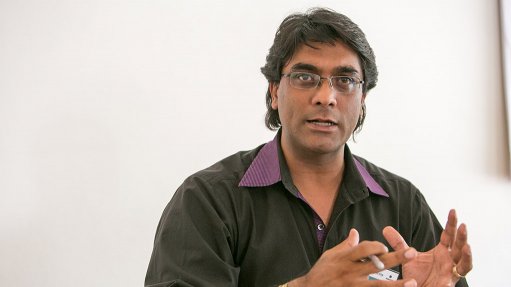
Vikash Mathura
Photo by: SWH MANCOSA
The Solar Water Heating Manufacturers Cluster of South Africa (SWHMancosa) was officially launched at the South Africa Capital Equipment Export Council (Saceec) office, in Benoni, on Wednesday.
Chaired by Franke Water Heating Systems MD Vikash Mathura, the cluster aimed to influence policy to promote local manufacturing through dialogue and collaboration with key stakeholders, while developing export markets for the SWH sector.
Speaking at the launch, Mathura said the industry lacked representation of a unified voice and body representing the manufacturers of the SWH industry. “[They] are critical role-players in forging solutions and suggestions to stakeholders, government and associated bodies,” he added.
The cluster, which was started in July last year, also aimed to deal with key issues relevant to the success of the sector, such as technical issues, standards, compliance, quality and transformation.
Further, it aimed to increase job creation opportunities and skills development through local manufacturing, sales and installation and maintenance activities.
Mathura added that the cluster currently had 14 registered members, but said this was likely to double in the next few months.
SWHMancosa deputy chairperson and Powerz-On Solar Systems MD Mike Breckenridge noted that local manufacturing was the biggest requirement for qualifying as a member of the cluster. “If you manufacture locally on a SWH basis, you qualify.”
“We do not [allow] importers to be part of this cluster. . .companies assembling imported machine parts are also not classed as manufacturers and will not be eligible for membership,” he pointed out.
Meanwhile, Saceec MD Sybil Rhomberg noted that becoming part of a cluster would grow companies’ businesses. “You will find that you start moving your business to another level – looking much broader,” she said.
“In the longer term, I hope to see many of you compete internationally. Once you have built up your local capacity, [your next step] is to move internationally,” she noted.
Speaking to Engineering News Online, Department of Trade and Industry director: environmental management and energy efficiency Zakhele Mdlalose said the cluster answered the department’s call for local manufacturing and production, which formed part of its mandate to ensure the procurement of 70% of its goods from local companies.
“We will see to it that the manufacturers are producing these components locally for the local market and that it is relevant to the contextual requirements,” he added.
STANDARDS
The South African Bureau of Standards (SABS) currently only had two standards presiding over the SWH industry – SANS 1307:2009 for domestic storage SWH systems and SANS 10106, which covered the installation, maintenance, repair and replacement of domestic SWH systems.
Cluster member Kwikot technical director Herman Weber, who also formed part of the SABS standards committee, said that, when parastatal power utility Eskom had first introduced its rebate programme, there were no standards for SWH systems and components, and “to try and qualify for the rebate programmes [companies imported] a lot of products that shouldn’t [have been in the market]”.
However, he noted that the power utility had some form of in-house performance standard regulation and that SABS had now “taken this regulation, panel beaten it and modified it; we hope to see the new standard published within four to five months.
“Currently, the specification only covers system testing and not component testing, the technical committee is looking into component testing,” SABS senior standards writer Sanj Lutchman added.